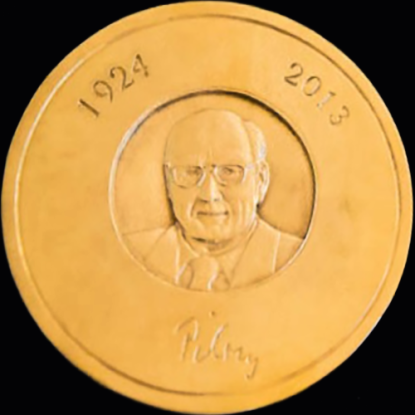TU Darmstadt honours renowned scientists with the Robert Piloty Prize
2022/07/08
For their research and pioneering work in the field of information and communication technology for visualisation, virtual and augmented reality as well as architectures and design of embedded electronic systems, Professor Jürgen Becker and Professor José Luis Encarnação have been awarded the TU Darmstadt's Robert Piloty Prize 2022. The accolade, which the TU awards for outstanding achievements in computer science, electrical engineering and information technology as well as applied mathematics, is endowed with a total of 10,000 euros and a medal.
Professor Dr.-Ing. Jürgen Becker was appointed to the University of Karlsruhe (TH) in 2001, which is now part of the renowned Karlsruhe Institute of Technology (KIT). There he is head of the Institute for Information Processing Technology (ITIV) in the Faculty of Electrical Engineering and Information Technology. Becker is director of the Embedded Systems and Sensors Engineering group at the Forschungszentrum Informatik. He is the author and co-author of more than 400 publications and over 30 patents with a focus on architectures and design of embedded electronic systems in industrial projects, among others, and here in particular in the automotive sector.
Becker, who studied computer science at the University of Kaiserslautern, worked from 1997 to 2001 as a research assistant in the Department of Electrical Engineering and Information Technology (Microelectronic Systems) also at the TU Darmstadt.
He was Prorector of the University of Karlsruhe, and from 2009 to 2012, as Chief Higher Education Officer (CHEO) of KIT, he was responsible for the area of study and teaching. From 2012 to 2014, Becker was Secretary General of CLUSTER Consortium, an association of twelve leading technical universities in Europe.
Professor Dr.-Ing. José Luis Encarnação, emeritus professor at the TU since 2009, taught and researched at the Technische Universität Darmstadt for 34 years. He played a major role in building up and shaping the Department of Computer Science, which celebrated its 50th anniversary this year and has become one of the leading departments in Germany. Encarnação was head of the Department of Graphical Interactive Systems and chairman of the board of the INI-GraphicsNet Foundation of the TU Darmstadt. He also made a name for himself as founder and long-time director of the Fraunhofer Institute for Computer Graphics (IGD) in Darmstadt.
Born in Portugal, he is considered a pioneer and globally recognised top researcher in the field of computer graphics. Among other things, the TU Emeritus is co-developer of the first ISO standard for computer graphics, “Graphical Core System (GKS)”. Also, it is thanks to him that we can see and use images, videos, games, simulations or animations on different computers, today.
Encarnação, author and co-author of more than 500 publications and technical papers, has been awarded numerous prizes for his achievements – including the Konrad Zuse Medal of the Gesellschaft für Informatik, the Steven Coons Award of the American Association for Computing Machinery and, in 2006, the Grand Cross of Merit of the Federal Republic of Germany.
The Robert Piloty Prize recognises outstanding achievements and exceptional research and development work in the fields of computer science, electrical engineering and information technology as well as mathematics. It is endowed with a total of 10,000 euros and a medal. In the field of electrical engineering and information technology, in view of Robert Piloty's work, preference is given to work in the field of data technology, and in mathematics to work in the field of applied mathematics.
Professor Dr.-Ing. Robert Piloty (1924-2013) was an internationally recognised pioneer in the research and development of program-controlled computing systems. He was appointed to the TH Darmstadt in 1964 and founded the Institute for Communications Processing of the then Faculty of Electrical Engineering (now the Institute for Data Technology of the Department of Electrical Engineering and Information Technology). He played a major role in establishing computer science as an independent discipline throughout Germany and at the TU Darmstadt. In 1990, the scientist, who had received many awards, became emeritus professor.



